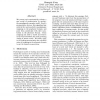Free Online Productivity Tools
i2Speak
i2Symbol
i2OCR
iTex2Img
iWeb2Print
iWeb2Shot
i2Type
iPdf2Split
iPdf2Merge
i2Bopomofo
i2Arabic
i2Style
i2Image
i2PDF
iLatex2Rtf
Sci2ools
119
click to vote
ACL
1997
1997
Paradigmatic Cascades: a Linguistically Sound Model of Pronunciation by Analogy
We present and experimentally evaluate a new model of pronunciation by analogy: the paradigmatic cascades model. Given a pronunciation lexicon, this algorithm first extracts the most productive paradigmatic mappings in the graphemic domain, and pairs them statistically with their correlate(s) in the phonemic domain. These mappings are used to search and retrieve in the lexical database the most promising analog of unseen words. We finally apply to the analogs pronunciation the correlated series of mappings in the phonemic domain to get the desired pronunciation. 1 Motivation Psychological models of reading aloud traditionally assume the existence of two separate routes for converting print to sound: a direct lexical route, which is used to read familiar words, and a dual route relyabstract letter-to-sound rules to pronounce previously unseen words (Coltheart, 1978; Coltheart et al., 1993). This view has been challenged by a number of authors (e.g. (Glushsko, 1981)), who claim that the...
ACL 1997 | ACL 2007 | Lexical | Lexical Items | Phonemic Domain |
| Added | 01 Nov 2010 |
| Updated | 01 Nov 2010 |
| Type | Conference |
| Year | 1997 |
| Where | ACL |
| Authors | François Yvon |
Comments (0)

